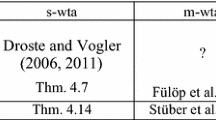Abstract
We give a new proof showing that it is not possible to define in monadic second-order logic (MSO) a choice function on the infinite binary tree. This result was first obtained by Gurevich and Shelah using set theoretical arguments. Our proof is much simpler and only uses basic tools from automata theory. We show how the result can be used to prove the inherent ambiguity of languages of infinite trees. In a second part we strengthen the result of the non-existence of an MSO-definable well-founded order on the infinite binary tree by showing that every infinite binary tree with a well-founded order has an undecidable MSO-theory.
Similar content being viewed by others
References
Arnold A., Rational ω-languages are nonambiguous, Theoret. Comput. Sci., 1983, 26(1–2), 221–223
Büchi J.R., On a decision method in restricted second order arithmetic, In: Proceedings of International Congress on Logic, Methodology and Philosophy of Science, Stanford University Press, Stanford, 1962, 1–11
Büchi J.R., Landweber L.H., Solving sequential conditions by finite-state strategies, Trans. Amer. Math. Soc., 1969, 138, 295–311
Carayol A., Wöhrle S., The Caucal hierarchy of infinite graphs in terms of logic and higher-order pushdown automata, In: Proceedings of the 23rd Conference on Foundations of Software Technology and Theoretical Computer Science, FST TCS 2003, Lecture Notes in Computer Science, 2914, Springer, Berlin, 2003, 112–123
Carayol A., Löding C., MSO on the infinite binary tree: choice and order, In: Proceedings of the 16th Annual Conference of the European Association for Computer Science Logic, CSL 2007, Lecture Notes in Computer Science, 4646, Springer, Berlin, 2007, 161–176
Caucal D., On infinite terms having a decidable monadic theory, In: Proceedings of the 27th International Symposium on Mathematical Foundations of Computer Science, MFCS 2002, Lecture Notes in Computer Science, 2420, Springer, Berlin, 2002, 165–176
Church A., Logic, Arithmetic and Automata, In: Proceedings of the International Congress of Mathematicians (Stockholm 1962), Inst. Mittag-Leffler, Djursholm, 1963, 23–35
Dawar A., Grädel E., The descriptive complexity of parity games, In: Proceedings of the 17th Annual Conference on Computer Science Logic, CSL 2008, Lecture Notes in Computer Science, 5213, Springer, Berlin, 2008, 354–368
Ebbinghaus H.-D., Flum J., Finite Model Theory, Perspectives in Mathematical Logic, Springer, Berlin, 1995
Grädel E., Thomas W., Wilke T., Automata, Logics, and Infinite Games, Lecture Notes in Computer Science, 2500, Springer, Berlin, 2002
Gurevich Y., Shelah S., Rabin’s uniformization problem, J. Symbolic Logic, 1983, 48(4), 1105–1119
Kähler D., Wilke T., Complementation, disambiguation, and determinization of Büchi automata unified, In: Proceedings of the 35th International Colloquium on Automata, Languages and Programming, ICALP 2008, Part I, Lecture Notes in Computer Science, 5125, Springer, Berlin, 2008, 724–735
Lifsches S., Shelah S., Uniformization, choice functions and well orders in the class of trees, J. Symbolic Logic, 1996, 61(4), 1206–1227
Lifsches S., Shelah S., Uniformization and Skolem functions in the class of trees, J. Symbolic Logic, 1998, 63(1), 103–127
Löding C., Automata and Logics over Infinite Trees, Habilitationsschrift, RWTH Aachen, 2009
McNaughton R., Testing and generating infinite sequences by a finite automaton, Information and Control, 1966, 9(5), 521–530
Monti A., Peron A., Systolic tree ω-languages: the operational and the logical view, Theoret. Comput. Sci., 2000, 233(1–2), 1–18
Mostowski A.W., Regular expressions for infinite trees and a standard form of automata, In: Computation Theory, Lecture Notes in Computer Science, 208, Springer, Berlin, 1984, 157–168
Rabin M.O., Decidability of second-order theories and automata on infinite trees, Trans. Amer. Math. Soc., 1969, 141, 1–35
Rabin M.O., Automata on Infinite Objects and Church’s Problem, American Mathematical Society, Boston, 1972
Rabinovich A., On decidability of monadic logic of order over the naturals extended by monadic predicates, Inform. and Comput., 2007, 205(6), 870–889
Safra S., On the complexity of ω-automata, In: Proceedings of the 29th Annual Symposium on Foundations of Computer Science, FoCS 1988, IEEE Computer Society Press, Los Alamitos, 1988, 319–327
Seidl H., Deciding equivalence of Finite tree automata, SIAM J. Comput., 1990, 19(3), 424–437
Semenov A.L., Decidability of monadic theories, In: Proceedings of the 11th International Symposium on Mathematical Foundations of Computer Science, MFCS 1984, Lecture Notes in Computer Science, 176, Springer, Berlin, 1984, 162–175
Siefkes D., The recursive sets in certain monadic second order fragments of arithmetic, Arch. Math. Logik Grundlagenforsch., 1975, 17(1–2), 71–80
Stearns R.E., Hunt H.B., On the equivalence and containment problems for unambiguous regular expressions, regular grammars and finite automata, SIAM J. Comput., 1985, 14(3), 598–611
Thomas W., Automata on infinite objects, In: Handbook of Theoretical Computer Science, B: Formal Models and Semantics, Elsevier, Amsterdam, 1990, 133–191
Thomas W., On the synthesis of strategies in infinite games, In: Proceedings of the 12th Annual Symposium on Theoretical Aspects of Computer Science, STACS’ 95, Lecture Notes in Computer Science, 900, Springer, Berlin, 1995, 1–13
Thomas W., Languages, automata, and logic, In: Handbook of Formal Language Theory, 3, Springer, Berlin, 1997, 389–455
Thomas W., Church’s problem and a tour through automata theory, In: Pillars of Computer Science, Essays Dedicated to Boris (Boaz) Trakhtenbrot on the Occasion of His 85th Birthday, Lecture Notes in Computer Science, 4800, Springer, Berlin, 2008, 635–655
Author information
Authors and Affiliations
Corresponding author
About this article
Cite this article
Carayol, A., Löding, C., Niwinski, D. et al. Choice functions and well-orderings over the infinite binary tree. centr.eur.j.math. 8, 662–682 (2010). https://doi.org/10.2478/s11533-010-0046-z
Received:
Accepted:
Published:
Issue Date:
DOI: https://doi.org/10.2478/s11533-010-0046-z




